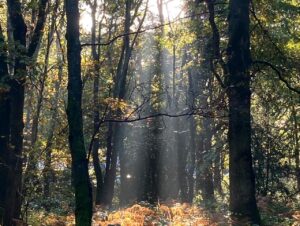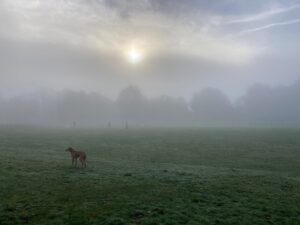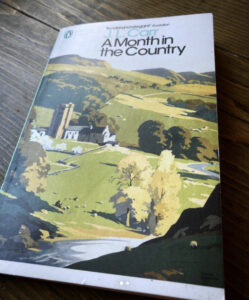Weird walks helped Mark Hooper through a year spent in and out of Reader’s Block.

It was a year of Weird Walking, and happiness, ending in sadness. But it wasn’t a year of reading. For some reason, after devouring books in the first lockdown, my consumption of words has diminished to pathetic levels in the years and months since.
I’m not sure why or how this happened. (Is ‘Reader’s Block’ a thing?). It definitely feels like a hangover from the social shock of lockdown, something that I’ve noticed a lot in 2023. This year’s Glastonbury, for instance, seemed to be a collective post-PTSD love-in; from the implied (almost every act referencing the ‘difficult time’ that both they and the crowd had been through) to the overt (Lewis Capaldi almost succumbing to his ticks before being lifted by the crowd in the most beautiful way). In short, it’s been tricky finding our way back to normality.
I did manage to hold a few books down, though. A few old reliables – John Le Carré, Graham Greene… stories written with such an efficiency of style, with all the fat trimmed off, they almost defy you not to finish them. And there were plenty of non-fiction books that I could consume in bitesize pieces: Shadowlands by Matthew Green being a perennial favourite, each chapter a fascinating tale of a lost British town or settlement, sometimes hiding in plain sight. (Not least the shocking story of Capel Celyn in Gwynedd, Wales, which was flooded to create a reservoir supplying Liverpool and the Wirral, despite almost unanimous Welsh opposition).

Among these was a new contender: Weird Walk: Wanderings and Wonderings Through the British Ritual Year. From the people behind the brilliant Weird Walk fanzine, this is a seasonal guide to the megaliths, chalk figures, barrows, standing stones, and other sites that are often relegated to a footnote, along with details of local customs, festivals and rituals. It dovetails neatly with my efforts to combine walking, writing and reading, digging into buried history while trying to uncover a little about myself en route. As therapy goes, I highly recommend it. And slowly, I’ve started to get over my Reader’s Block. I won’t say I’ve finally found a cure, but a steady, gradual diet of good words helps. If I can identify a breakthrough moment, it was picking up a copy of JL Carr’s A Month in the Country, a beautiful little book about a WWI survivor, recovering from both the war and the end of his marriage as he takes on a job uncovering a medieval mural on the wall of a Yorkshire chapel. In its gentle, tender way, it eased me back into love with the written word. Like all the best books, it felt like it was for me – as if Carr understood what I’d been going through and offered – if not a solution, a path forwards at least; the offer of consolation and comfort through empathy.

I posted about it on social media and was surprised by the number of people who had been through the same emotions on reading it – some who, like me, had just discovered it, some who had read it at earlier times of stress in their lives, others who had returned to it during lockdown. The quote on the book jacket – from DJ Taylor for the Spectator – describes it as ‘unlike anything else in modern English literature’. It’s like a friend talking to you – not trying to lecture or even offer advice, just sharing a moment, written in flashback, as if Carr knows this little anecdote will help the reader as much as it does him. It’s a wonderful, wonderful book. It got me reading again in 2023. I can’t think of anything I needed more.